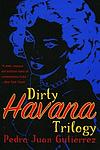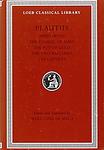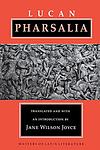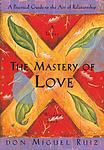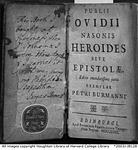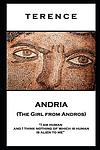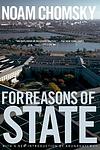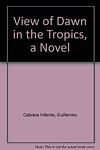The Greatest Roman, Cuban Books of All Time
Click to learn how this list is calculated.
This list represents a comprehensive and trusted collection of the greatest books. Developed through a specialized algorithm, it brings together 305 'best of' book lists to form a definitive guide to the world's most acclaimed books. For those interested in how these books are chosen, additional details can be found on the rankings page.
Genres
Countries
Date Range
Reading Statistics
Click the button below to see how many of these books you've read!
Download
If you're interested in downloading this list as a CSV file for use in a spreadsheet application, you can easily do so by clicking the button below. Please note that to ensure a manageable file size and faster download, the CSV will include details for only the first 500 books.
Download-
26. Natural History by Pliny (the Elder)
"Natural History" is an extensive work of literature that provides a comprehensive look at the knowledge of the natural world during the Roman era. The book is divided into 37 volumes, each focusing on different aspects such as geography, anthropology, zoology, botany, and mineralogy. The author's curiosity and fascination with the world are evident in his detailed observations and descriptions. The book also includes discussions on art, sculpture, and various other topics, providing a rich and detailed snapshot of the Roman understanding of the world.
The 3209th Greatest Book of All Time -
27. The Consolation of Philosophy by Boethius
"The Consolation of Philosophy" is a philosophical work written in the 6th century, where the author, imprisoned and awaiting execution, engages in a series of dialogues with Lady Philosophy about the nature of life and human happiness. The author grapples with the harsh realities of his own life, including his fall from favor, his unjust imprisonment, and impending execution. Through these dialogues, the author learns to understand life from a philosophical and spiritual perspective, finding consolation and peace amidst his dire circumstances. The work is a profound meditation on fate, free will, time, and eternity.
The 3469th Greatest Book of All Time -
28. On Obligations by Marcus Tullius Cicero
"On Obligations" is a philosophical treatise that explores the ethical and moral duties of individuals in society. Written in the form of a dialogue, the text delves into the nature of justice, the importance of the common good, and the role of virtue in personal and public life. The author articulates a framework for understanding and fulfilling one's obligations, which he argues are derived from both natural law and human reason. Through a detailed examination of various ethical dilemmas and practical situations, the work provides insights into how individuals should act with integrity and wisdom to uphold both legal and moral responsibilities.
The 3802nd Greatest Book of All Time -
29. On The Ends Of Good And Evil by Marcus Tullius Cicero
"On the Ends of Good and Evil" is a philosophical work that explores the ethical theories of Hellenistic schools, including Stoicism, Epicureanism, and the Peripatetic tradition. Through a series of dialogues, the text delves into the nature of happiness and the ultimate end of human action, examining what constitutes the highest good. The author critiques and compares the doctrines of these schools, ultimately defending the Stoic view that virtue is the sole basis of happiness and the ultimate goal in life, while also acknowledging valuable insights from other philosophical traditions.
The 4699th Greatest Book of All Time -
30. Dirty Havana Trilogy by Pedro Juan Gutierrez
This book is a raw and gritty portrayal of life in Havana, Cuba during the economic collapse of the 1990s. The story is narrated by a former journalist turned hustler who lives in the city's slums. The protagonist survives through a series of odd jobs and illegal activities, as he navigates through a world of poverty, violence, and corruption. The narrative is filled with graphic depictions of sex, drugs, and the struggle to survive, providing a stark contrast to the romanticized image of Havana.
The 4770th Greatest Book of All Time -
31. Thyestes by Seneca
"Thyestes" is a classic tragedy that centers around the mythological figures of the House of Atreus. The story unfolds as Atreus, the King of Mycenae, seeks revenge on his brother Thyestes for committing adultery with his wife. In a gruesome act of vengeance, Atreus kills Thyestes' sons and serves them to him at a feast. The narrative explores themes of power, betrayal, revenge, and the horrific consequences of unchecked ambition.
The 5758th Greatest Book of All Time -
32. Amphitryon by Plautus
The play is a comedic tale set in ancient Greece, where the god Jupiter, enamored with Alcmena, the wife of the general Amphitryon, takes on her husband's form to seduce her while Amphitryon is away at war. Meanwhile, Mercury, the messenger god, assists Jupiter by disguising himself as Amphitryon's slave, Sosia. The resulting confusion and mistaken identities lead to a series of humorous situations, as the real Amphitryon returns home to find his place usurped by the god. The play explores themes of deception, infidelity, and the interplay between gods and mortals, all wrapped up in a farcical package that entertains while it provokes thought about the nature of identity and trust.
The 5919th Greatest Book of All Time -
33. The Golden Age by José Martí
"The Golden Age" is a heartfelt coming-of-age story set in the late 19th century, following the life of a young boy named José Martí. Through his eyes, readers witness the challenges and triumphs of growing up in a tumultuous time in Cuba's history. Martí's journey is marked by his unwavering passion for justice, his deep love for his homeland, and his relentless pursuit of freedom and equality. This poignant narrative explores themes of identity, patriotism, and the power of hope, leaving readers with a profound understanding of the human spirit and the enduring fight for liberty.
The 6407th Greatest Book of All Time -
34. Catiline's War, The Jugurthine War, Histories by Sallust
This book is a combination of three works by a Roman historian and politician, focusing on the political and military events of the late Roman Republic. It first covers the conspiracy led by Catiline in 63 BC, then shifts to the war against Jugurtha in North Africa, and finally provides a fragmentary history of Rome from 78-67 BC. The author uses these events to critique the moral decay of Rome, highlighting the corruption, greed, and ambition that he believed led to the fall of the Republic.
The 6533rd Greatest Book of All Time -
35. Pharsalia by Lucan
"Pharsalia," also known as "The Civil War," is an epic poem that delves into the intense and tumultuous period of the Roman Republic's downfall, focusing on the conflict between Julius Caesar and Pompey the Great. The narrative, rich in rhetorical and dramatic elements, presents a grim and philosophical reflection on the nature of power, the moral decay of Rome, and the catastrophic consequences of civil strife. Through its vivid and often gruesome depictions of battles, political intrigue, and the personal ambitions that drive men to treachery and violence, the poem serves as a cautionary tale about the fragility of political systems and the human cost of war.
The 7193rd Greatest Book of All Time -
36. The Art Of Love by Ovid
The book in question is a didactic poem that explores the intricacies of love and seduction from the perspective of ancient Roman society. It offers a series of instructions and advice on how to attract and retain lovers, presented in a playful and often ironic tone. The work is divided into three books, with the first two primarily addressing men and teaching them how to find, win, and keep a woman's love, while the third book is directed at women, advising them on how to secure and captivate a man's affection. Throughout the text, the author interweaves mythological references and personal anecdotes, creating a rich tapestry of amorous strategies that reflect the social and moral attitudes towards love and relationships of his time.
The 7193rd Greatest Book of All Time -
37. Six Tragedies by Seneca
"Six Tragedies" is a collection of dramatic works that delve into the darker aspects of human nature and the tragic consequences of hubris, revenge, and passion. These classical plays, written in the Roman Imperial period, reimagine ancient myths and historical events, exploring themes of power, madness, and moral corruption. The narratives often feature protagonists who face overwhelming internal and external conflicts, leading to catastrophic outcomes. The plays are notable for their intense emotional expression, philosophical insights, and the playwright's masterful use of language to probe the complexities of the human condition.
The 7193rd Greatest Book of All Time -
38. The Rope by Plautus
"The Rope" is a classic Roman comedy that revolves around the mishaps and misunderstandings that ensue when a young man's plan to rescue his lover from a life of servitude goes awry. The play humorously depicts the lengths to which characters will go for love and freedom, featuring a cast of cunning slaves, mistaken identities, and a twist of fate. As the plot unfolds, the young man's father becomes entangled in the scheme, leading to a series of comic situations that culminate in an unexpected resolution. The work is a testament to the enduring nature of farce and the skillful use of dramatic irony to entertain and engage the audience.
The 7193rd Greatest Book of All Time -
39. Satires by Juvenal
"Satires" is a collection of poetic essays from ancient Rome that offer a scathing critique of the social and political landscape of the time. The work delves into the corruption, decadence, and moral decay of Roman society, using biting wit and a satirical tone to expose the vices and follies of its citizens and leaders. The author employs a range of literary devices, from irony to hyperbole, to lambast the greed, hypocrisy, and depravity he perceives, while also reflecting on human nature and the challenges of living a virtuous life amidst widespread societal failings. The text is not only a commentary on the specific historical context but has also been interpreted as a timeless exploration of the human condition.
The 7193rd Greatest Book of All Time -
40. Heroides by Ovid
The book is a collection of fifteen epistolary poems presented as though written by various mythological heroines of Greek and Roman lore to their absent lovers. These letters express the women's emotions as they lament their separation, recount their memories, and plead for their lovers' return. The work explores themes of love, betrayal, and the female perspective within the context of classical myths, offering a unique insight into the emotional lives of characters such as Penelope, Dido, and Medea, who are traditionally depicted through the eyes of male heroes and writers.
The 7193rd Greatest Book of All Time -
41. Pseudolus by Plautus
"Pseudolus" is a classic Roman comedy that revolves around the clever and scheming slave Pseudolus, who aims to help his young master Calidorus win the heart of his beloved Phoenicium, a courtesan who is about to be sold to a Macedonian soldier. The play unfolds as Pseudolus concocts a series of intricate and humorous plans to deceive the pimp Ballio, outwit the soldier, and secure Phoenicium's freedom, all while promising his master the impossible. The narrative is filled with witty dialogue, slapstick humor, and satirical commentary on social relations, showcasing the slave's cunning and resourcefulness in the face of adversity.
The 7193rd Greatest Book of All Time -
42. The Girl From Andros by Terence
"The Girl From Andros" is a classic Roman comedy that revolves around the complexities of love and mistaken identity. The plot centers on a young Athenian man who falls in love with a girl believed to be a courtesan from the island of Andros, but who is, in fact, a freeborn woman. As he seeks to marry her, he must navigate the social expectations of his status, the interference of his slave who tries to help him with a cunning plan, and the revelation of the girl's true identity. The play humorously explores themes of class, romance, and the roles of women in ancient society, all while employing the typical misunderstandings and deceptions of comedic storytelling.
The 7193rd Greatest Book of All Time -
43. The Mother In Law by Terence
The play is a classic Roman comedy that revolves around the convoluted love lives and familial disputes of its characters. The central plot focuses on a young man who impregnates his lover, the daughter of his neighbor. The situation is further complicated by the young man's domineering mother-in-law, who is unaware of the relationship and pregnancy. The narrative unfolds with a series of misunderstandings, schemes, and comic relief provided by a cunning slave, ultimately leading to resolutions that restore harmony and social order. The work explores themes of love, deception, and the dynamics of power within family structures, all while offering a satirical look at Roman society.
The 7193rd Greatest Book of All Time -
44. The Braggart Soldier by Plautus
"The Braggart Soldier" is a classic Roman comedy that revolves around the farcical misadventures of a pompous and cowardly military man who boasts about his exploits in love and war. The play unfolds with a clever slave scheming to outwit his master and help his friend, a young lover, reunite with his kidnapped beloved, who is being held by the braggart soldier. Through a series of humorous deceptions, mistaken identities, and slapstick humor, the characters navigate a world of social hierarchies and romantic entanglements, leading to a resolution that ridicules the soldier's arrogance and celebrates the cunning of the underdog.
The 7193rd Greatest Book of All Time -
45. On The Gods by Marcus Tullius Cicero
The book is a philosophical treatise that explores ancient theological concepts and the nature of the gods, presenting a critical examination of various religious beliefs and practices of the time. The author, a Roman statesman and scholar, engages in a series of dialogues that delve into the existence and attributes of the divine, contrasting the Epicurean view of detached gods with the Stoic belief in a providential order. Through rigorous argumentation and eloquent rhetoric, the work seeks to understand the role of the gods in human life and the universe, while also reflecting on the implications of piety, fate, and the pursuit of happiness within the context of Roman religion and philosophy.
The 7193rd Greatest Book of All Time -
46. Reasons Of State by Alejo Carpentier
"Reasons of State" is a satirical novel that delves into the life of a Latin American dictator who clings to power through manipulation and the ruthless suppression of opposition. Set against the backdrop of early 20th-century political turmoil, the narrative explores themes of corruption, decadence, and the absurdity of authoritarian regimes. The protagonist, a caricature of the archetypal tyrant, navigates through a series of farcical and tragic events, revealing the hollow core of his regime's pomp and circumstance. The novel critiques the self-serving justifications of those in power, who often cloak their actions under the guise of state necessity and progress, while their personal and political decisions lead to the suffering and disenfranchisement of the people they rule.
The 7193rd Greatest Book of All Time -
47. View Of Dawn In The Tropics by Guillermo Cabrera Infante
The book is a unique tapestry of Cuban history and culture, presented as a series of vignettes that blend fact with fiction, reality with surrealism. Through a mosaic of brief, often poetic narratives, the work captures the essence of life in the tropics, marked by the rise and fall of revolution, the ebb and flow of political tides, and the personal stories that define the human experience within this vibrant setting. The fragmented structure mirrors the tumultuous history of Cuba itself, offering glimpses into the island's colonial past, its struggle for independence, and the ongoing complexities of its social and political identity.
The 7193rd Greatest Book of All Time -
48. Poems Of Nicolás Guillén by Nicolás Guillén
This collection of poetry delves into the rich tapestry of Afro-Cuban culture, exploring themes of social justice, racial identity, and political struggle. The poet employs a unique blend of lyricism and vernacular language, often incorporating the rhythms of son and Afro-Cuban music, to give voice to the marginalized and oppressed. Through vivid imagery and poignant commentary, the poems reflect on the complexities of Cuba's history and the poet's own experiences, offering a powerful testament to the resilience of the human spirit in the face of adversity.
The 7193rd Greatest Book of All Time -
49. Maitreya by Severo Sarduy
"Maitreya" is a novel that delves into the themes of transformation, identity, and transcendence, set against the backdrop of a tumultuous period in Cuba. The narrative follows the journey of a protagonist who is both a revolutionary and a seeker of spiritual enlightenment, intertwining political upheaval with mystical experiences. As the character navigates through a world of chaos and change, the story explores the convergence of Eastern philosophies and Western ideologies, ultimately questioning the nature of reality and the potential for rebirth in the midst of societal collapse. The novel's rich, poetic language and complex symbolism offer a multifaceted examination of the human condition and the search for meaning.
The 7964th Greatest Book of All Time -
50. The Ill Fated Peregrinations Of Fray Servando by Reinaldo Arenas
The book is a fictionalized account of the life of Fray Servando Teresa de Mier, a real-life Dominican friar from the 18th century. It follows his numerous escapes from colonial authorities across Latin America and Spain after he delivered a controversial sermon in Mexico City. The narrative, infused with magical realism, portrays Fray Servando's adventures and misfortunes as he becomes a symbol of freedom and resistance against oppressive regimes. His journey is marked by a series of bizarre and fantastical encounters, reflecting the author's critique of totalitarianism and exploration of the themes of liberty, identity, and the absurdity of political persecution.
The 8503rd Greatest Book of All Time
Reading Statistics
Click the button below to see how many of these books you've read!
Download
If you're interested in downloading this list as a CSV file for use in a spreadsheet application, you can easily do so by clicking the button below. Please note that to ensure a manageable file size and faster download, the CSV will include details for only the first 500 books.
Download



